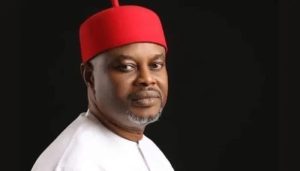In a recent address at The Platform Nigeria on 12 June 2025, Anambra State Governor Chukwuma Soludo lauded President Bola Tinubu’s economic reforms, crediting them with rescuing Nigeria’s economy from collapse and restoring public finance solvency. While Soludo’s optimism and call for an ethical and ideological rebirth are noteworthy, his statement raises critical questions about the tangible outcomes of these reforms, the credibility of his endorsements, and the broader socio-economic context. This critique examines the governor’s claims, highlighting areas of concern and gaps in his narrative.
Soludo’s assertion that Tinubu’s “audacious structural reforms” have pulled Nigeria’s economy back from the “tipping point” is bold but lacks sufficient evidence to convince a sceptical public. He cites endorsements from the World Bank, IMF, and rating agencies like Fitch and Moody’s as validation. However, these institutions have historically faced criticism for prioritising neoliberal frameworks that often exacerbate inequality in developing nations. Soludo himself acknowledges his past critiques of the World Bank and IMF, which makes his reliance on their approval inconsistent and opportunistic. The public, already burdened by soaring inflation and a weakened naira, may view such endorsements as detached from their lived realities.
Moreover, Soludo’s claim that public finance is “back on a solvency path” glosses over persistent fiscal challenges. Nigeria’s debt-to-GDP ratio remains high, and the 2025 budget projects significant borrowing to cover deficits. While macro fundamentals may show signs of recovery, as Soludo suggests, these gains are not yet translating into relief for ordinary Nigerians. Unemployment remains rampant, and the cost-of-living crisis has intensified since Tinubu’s administration removed fuel subsidies and floated the naira. Without addressing these ground-level impacts, Soludo’s narrative risks appearing overly optimistic and disconnected.
Soludo’s emphasis on a “nationwide ethical and ideological rebirth” is a compelling vision but lacks specificity. He rightly identifies the erosion of values like hard work and integrity, pointing to a culture that celebrates unearned wealth. His critique of “transactional governance” over “transformational leadership” is incisive, reflecting Nigeria’s entrenched patronage systems. However, his proposed solutions—such as combating beliefs in “magical wealth” through legislation, education, and media—are broad and abstract. How, for instance, does one legislate against a mindset? Without concrete policy frameworks or timelines, these ideas risk remaining rhetorical.
Additionally, Soludo’s call for ideological unity among political parties is idealistic but impractical in Nigeria’s polarised political landscape. The All Progressives Grand Alliance (APGA), which he leads, has limited national influence, and major parties like the APC and PDP are deeply entrenched in transactional politics. His suggestion for a “new, issue-based political culture” ignores the structural barriers—such as weak institutions and voter apathy—that perpetuate the status quo.
Soludo highlights federal and Anambra state initiatives, such as the NELFUND student loan scheme and Anambra’s One Youth, Two Skills programme, as investments in Nigeria’s future. These programmes are indeed steps toward empowering youth and fostering patriotism, as he claims. However, their impact remains limited and uneven. The NELFUND scheme, for instance, has faced criticism for bureaucratic bottlenecks and inadequate funding, leaving many eligible students without access. Similarly, while Anambra’s skills programme is commendable, its scalability across Nigeria’s 36 states is questionable given varying levels of governance capacity and funding.
Soludo’s focus on these initiatives also sidesteps critical challenges in education and healthcare. Increased spending on free education and healthcare in Anambra is laudable, but nationwide, public schools and hospitals remain underfunded and overstretched. By framing these programmes as transformative, Soludo risks overstating their current impact and diverting attention from systemic deficiencies.
Soludo urges commentators to adopt “rigorous counterfactual analysis” and provide credible alternatives when critiquing the government. This is a valid call for evidence-based discourse, but it places an undue burden on critics while shielding the government from accountability. The Tinubu administration has yet to provide comprehensive data on the outcomes of its reforms, making it difficult for analysts to conduct the rigorous evaluations Soludo demands. Transparency in government spending, subsidy removal savings, and debt management would enable more robust critiques. Until such data is forthcoming, Soludo’s challenge to critics feels like a deflection.
While Soludo’s focus on cultural renewal is insightful, it underestimates the structural drivers of Nigeria’s challenges. Poverty, weak infrastructure, and insecurity are not merely products of a flawed value system but of decades of mismanagement and policy failures. His call for a “critical mass of new Nigerians” who are patriotic and selfless is inspiring but ignores the reality that citizens’ disengagement often stems from distrust in governance. Rebuilding trust requires not just cultural shifts but tangible improvements in security, job creation, and public services—areas where Tinubu’s reforms have yet to deliver convincingly.
Governor Soludo’s endorsement of President Tinubu’s economic reforms reflects a blend of optimism and pragmatism, but it falls short of addressing the complexities of Nigeria’s socio-economic crisis. His reliance on international endorsements, vague calls for ethical renewal, and selective focus on government initiatives weaken the credibility of his claims. While his vision for a patriotic, value-driven Nigeria is aspirational, it lacks the practical roadmap needed to inspire confidence. For Soludo’s critique to resonate, it must be grounded in the realities faced by Nigerians and accompanied by clear, actionable strategies to bridge the gap between rhetoric and results.
Subscribe to our newsletter!






